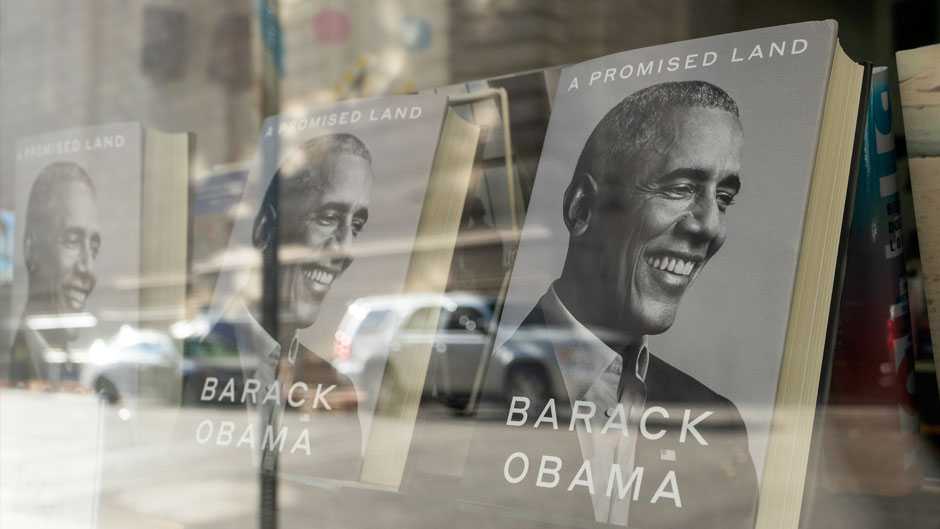In publishing the first volume of his presidential memoirs, “A Promised Land,” in mid-November, Barack Obama satisfied what has become a standard responsibility for former presidents in our modern era.
While celebrity lends a boost, the ultimate success of Obama’s or any memoir depends on a muse-infused skill set, according to Mia Leonin and Jaswinder Bolina, faculty members in the Creative Writing Program who have both written in the genre.
“We read memoirs because the person, often a public figure, fascinates us or the situation, story, or historical moment intrigues us,” said Leonin, a senior lecturer in the University of Miami College of Arts and Sciences, adding that Obama’s presidential memoir is virtually assured success because “he’s a fascinating human being.”
Yet writing a successful memoir, presidential or otherwise, demands more, suggested Leonin, who in addition to publishing several poetry collections has written her own memoir, “Havana and Other Missing Fathers.”
“It's not enough to have an extraordinary story or even to tell it well. A memoirist must make sense and meaning of their story—we want to know the ‘so what?’ of a memoir,” said Leonin. “It is a beautiful coat made all the more remarkable by showing how it’s stitched and seamed.”
Jaswinder Bolina, an associate professor in the college, agreed that the best memoirs require a range of writing talents and that, ultimately, they must convey an intimacy that grants us backstage access.
“What’s interesting to most people is what the writer is willing to reveal to us about their private feelings about very public figures,” said Bolina, an award-winning poet who last year published a collection of personal essays “Of Color.”
“We’re fascinated to know what’s happening on the public stage from which we are so far removed,’ added Bolina, “like we all watched this on TV, but what was it really like when you were there?”
Books across all platforms have enjoyed a surge in popularity and sales during the pandemic. Print book sales have increased for the past five years and are up 8 percent this past year, according to NPD Bookscan, which tracks the U.S. industry. Both writers agreed that nonfiction writing in general and the memoir in particular—fueled by the fascination with “the personal”—are very much in vogue.
“Nonfiction writing, whether creative or journalistic nonfiction, has become a powerhouse that is absolutely on equal footing with the long-standing form of novelized fiction,” said Bolina.
Memoirs tend to focus on a particular theme, event, or aspect of one's life as opposed to autobiography which seeks to tell the story of a person's life, explained Leonin, adding that a memoir “can take many shapes.”
For Bolina, memoir is akin to “old-fashion autobiography,” and he contrasted the form with his personal essays that use a past experience—such as when he was stopped while riding his bike as a young boy and harangued with racial insults—as a “jumping off point, a way of getting into talking about how race is activated and what it feels like to be a racialized person in the world.”
While already popular, Leonin suggested that the pandemic may further fuel the memoir’s popularity.
“We've experienced a tremendous amount of isolation and opposition in the last several months and they are a microcosm of the last several years,” she said. “People are hungry for shared experiences. And a great memoir has the potential to buckle us in with the promise of veracity and take us on a great adventure with great storytelling and drop us off somewhere surprising through insightful exposition.”
This respect for veracity—truthfulness—is at the heart of all writing, both writers noted. And memoir writing, which requires the author to go back in time to resurrect past experiences and feelings, has been described as chasing time and truth down the rabbit hole of memory.
Leonin’s own favorite memoir, Joan Didion's “The Year of Magical Thinking,” reflects the truth she expects from the genre.
“Didion has a novelist's eye for setting a scene and a journalist's vision for the larger importance of individual moments, and she writes with unguarded honesty about the sudden loss of her husband,” Leonin said. “That memoir created enough distance that we could step into the author's grief and experience it and come out on the other side.”
“You have to write it well but in a way that’s believable,” said Bolina, recognizing that ability as a key facet of the memoirist’s craft. “My MFA focused on poetry and I had no special training for nonfiction writing, so I had to learn on the job how to separate the facts of what I know for certain without embellishing too much.”
The question of memory—accurately and truthfully recounting what may have happened decades ago—poses a daunting challenge for the memoirist, Bolina said.
“I understand the vicissitudes of memory in myself—knowing just how lousy my memory is and how easy it is to color a memory or misremember it,” he said. “Every time you remember something your brain relives it but creates it anew. There’s a lot of space there for mistakes to be made and for little errors in the code,” he added.
“Memory is not like a computer hard drive where there’s a reliable file stored that you can access at any point and all the details are real,” he continued. “Regardless how the mind reconstructs an experience, however, the memory is not discredited. It can offer insight—all the neuroscience tells us that.”
Writing a successful memoir starts—but does not end—with extraordinary status or experience.
“Either you’re famous like Obama and can give us insight into a place where we’ll never go or you’ve experienced something extraordinary—such as the story of the young activist in Pakistan shot by the Taliban or the guy who gets caught in the canyon and has to cut off his arm. You have to have a really interesting story and then you have to write it really well,” Bolina said.

